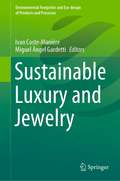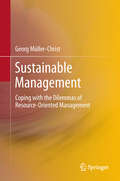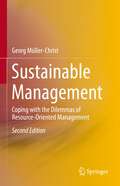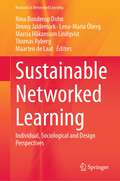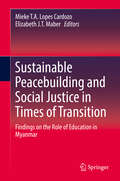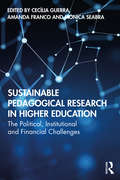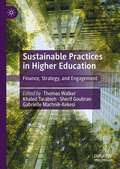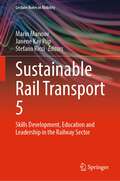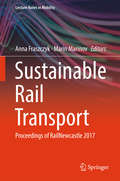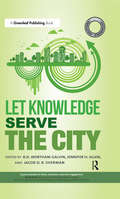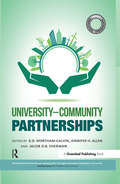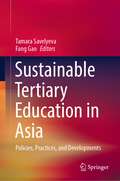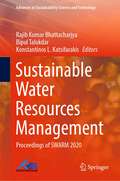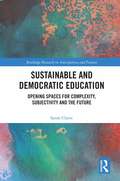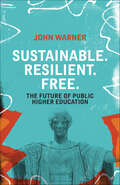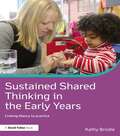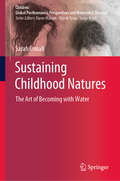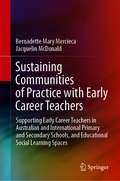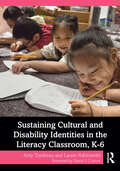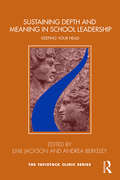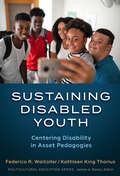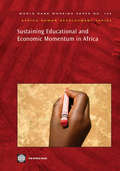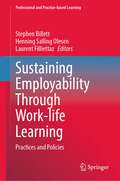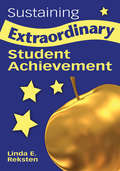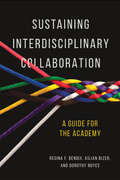- Table View
- List View
Sustainable Luxury and Jewelry (Environmental Footprints and Eco-design of Products and Processes)
by Ivan Coste-Manière Miguel Ángel GardettiThis book discusses the current trends in luxury and jewelry and presents how to make these sustainable for a better future. In the age of sustainability, we increasingly see how designers and consumers begin to think beyond a product's look&feel and operation, and are especially concerned about what has happened during its manufacturing process and what will happen once its useful life comes to an end. Today, consumers value that every industrial product and process should be sustainable, beneficial for the people, the economy and the planet, and so is the case for jewelry.
Sustainable Management
by Georg Müller-ChristIn this book, a resource-oriented perception of sustainable management is presented. Firms that decide to act more sustainable have to bear in mind that they do not only need resources for economic activities today, but that they will need these tomorrow as well. This leads to contradictory management rationalities firms must deal with. The author presents his findings as regards the development of environmental and social responsibility and introduces a theory of management ecology. He takes a close look at the contradictions businesses have to face when governing their activity towards sustainability. Moreover, he identifies different notions of the resource term in management studies and develops a "sustainable resource management" which could help businesses redirect their economic activities from a solely profit-oriented to a resource-oriented way of operating.
Sustainable Management: Coping with the Dilemmas of Resource-Oriented Management
by Georg Müller-ChristIn the second edition of this book, the concept of resource-based sustainability has once again been expanded to include further references to modern management theories. The author shows that overcoming the dilemmas that sustainability creates for companies and all organizations leads to more complex decisions that also require higher levels of awareness. The concept of sustainable leadership is closely related to the resource approach. Finally, readers will learn how to tell a compelling transformation narrative toward sustainability.
Sustainable Networked Learning: Individual, Sociological and Design Perspectives (Research in Networked Learning)
by Thomas Ryberg Maarten De Laat Nina Bonderup Dohn Jimmy Jaldemark Lena-Maria Öberg Marcia Håkansson LindqvistThis book provides cutting-edge research on networked learning, focusing on issues of sustainability in design for learning, data use, and networked learning connections. It contributes novel theoretical perspectives on networked learning, its role in society and potential for sustainable learning design. It further contributes a set of exemplary empirical cases - exemplary in terms of their innovative learning designs, pedagogical use of technology in connecting learners, and/or critical reflections on implications of utilizing different technologies to support learning. The book is organized into four main sections: 1) Data and datafication, 2) Sustainable learning design, 3) Sociological perspectives on Networked Learning, and 4) Networked learning in times of lockdown. Concluding the book is a final chapter which points to emerging issues within the field of networked learning, based on discussion of perspectives from the chapters The book's focus on the nature of learning and technology-mediated interactions makes it of prime significance to researchers and practitioners in the field of technology-supported teaching and learning.
Sustainable Peacebuilding and Social Justice in Times of Transition: Findings on the Role of Education in Myanmar
by Mieke T.A. Lopes Cardozo Elizabeth J.T. MaberThis book offers a unique insight into the ways in which education systems, governance, and actors at multiple scales interact in initial steps towards building peace. It presents a spectrum of recently conducted research in the context of Myanmar, a society in the midst of challenging transitions, politically, socio-culturally and economically. Divided in 3 thematical research areas, the first part on Myanmar’s policy landscape aims to unravel the integration of peacebuilding into the education sector at macro and micro policy levels. The second part examines the role teachers play in processes of peacebuilding, and the third part examines ways in which formal and non-formal peacebuilding education programs address the agency of youth in Myanmar. This book is an essential guide for students embarking in the field of education, conflict and peacebuilding.
Sustainable Pedagogical Research in Higher Education: The Political, Institutional and Financial Challenges
by Cecília Guerra Amanda Franco Mónica SeabraConsidering both the theoretical and practical possibilities of the sustainability of higher education research in a world in which research budgets are often hard to secure, this book shares results from international research to demonstrate the innovation occurring to secure sustainable research funding. Rooted in diverse research experiences and reflections of academics and higher education institutional leaders, this book explores ways to promote and sustain pedagogical innovation in the higher education context. Beginning with an analysis of theoretical views from political, institutional and research practice spheres about the relevance of sustainability of educational research in higher education, it considers the need to promote educational research focused on pedagogical innovations in higher education. The second part of the book addresses practical experiences of funded educational research and offers guidance to assure the future of sustainable pedagogical interventions. This book is ideal reading for anyone interested in the role of sustainable funding in ensuring the future of higher education research, including researchers and postgraduate or undergraduate students who are researching or interested in the topic. It will also be of interest to senior institutional leaders and managers responsible for educational development in higher education.
Sustainable Practices in Higher Education: Finance, Strategy, and Engagement
by Thomas Walker Sherif Goubran Gabrielle Machnik-Kekesi Khaled TarabiehThis edited collection presents, reviews, and critically analyzes sustainable practices and long-term-oriented decision-making in Higher Education Institutions (HEIs). Campus closures and the quick transition to hybrid or e-learning as a result of the COVID-19 pandemic caused HEI stakeholders, including students, faculty, and staff, to swiftly adopt new ways of learning, teaching, and administering that were unfathomable only months before. This radical and challenging shift left many in academia with a sense that there is tremendous potential for HEIs to take the lead – both from an educational and practical standpoint – in fostering on- and off-campus sustainability and combatting climate change. In this book, the editors and their contributors systematically highlight current challenges that are slowing or derailing HEIs’ finance-related initiatives and practices geared toward sustainability. The case studies collected in this book provide a holistic overview of the ways in which financial and other long-term decisions can lead to more sustainable practices in higher education.
Sustainable Rail Transport 5: Skills Development, Education and Leadership in the Railway Sector (Lecture Notes in Mobility)
by Marin Marinov Stefano Ricci Janene Kay PiipThis book offers a timely collection of chapters on innovative research and education-focused developments in the vast field of rail transport, including rail operations, management, economics, and sustainable infrastructure. Adding on the tradition of the previous four volumes, here a special emphasis is given on the current needs for rail skills development, innovating rail higher education provision, and solutions aimed at bridging the gap between railway education and industry expectations. Strategies for making the rail sector more attractive to early careers and younger generations, and methods to identify and retain talents in the railway sector are also described. Gathering peer-reviewed contributions prepared by the RailUniNet and AstonRail strategic partnership members, this book offers a timely view on current developments on rail-focused teaching and learning methods and approaches with extensive information for both academics and professionals specialising in railway research, technologies, training and education.
Sustainable Rail Transport: Proceedings of RailNewcastle 2017 (Lecture Notes in Mobility)
by Marin Marinov Anna FraszczykThese conference proceedings include a collection of articles presented at the RailExchange conference in October 2017 at Newcastle University, UK. They will be useful for researchers in developing countries looking for opportunities of knowledge exchange. The RailExchange project aimed to develop sustainable railway education in Thailand, via international partnerships and industry collaborations based around stakeholders' expertise and experiences. It involved staff exchange (academics and researchers) between Mahidol and Newcastle University for joint research and curriculum development and also organizing railway conferences and workshops in both Thailand and the UK.The papers published here focus on rail-related issues and present a perspective of a widely understood 'exchange' in academia and industry environments. 'Exchange' is perceived as rail knowledge exchange between partners, rail staff exchange between academia and/or industry, research exchange between teams, student-lecturer knowledge exchange, academia-industry collaboration, etc. In addition, more general rail-related papers are also included.
Sustainable Solutions: Let Knowledge Serve the City
by B.D. Wortham-Galvin Jennifer H. Allen Jacob D.B. ShermanPortland, Oregon. Sustainability might not seem glamourous, but Portland is making a name for itself as one of the most sustainable cities in the world. Whether you’ve heard about the farmers’ markets, the cycle-friendly streets or the ongoing efforts to balance livability and equity, Portland is leading the way in urban sustainability: this book helps us understand how it achieves this.A critical component of Portland’s success is collaboration between different communities and institutions; the Sustainable Solutions series examines higher education’s role in these partnerships. In exploring how best to “let knowledge serve the city”, Portland State University translates its founding motto from mere words to applied research and action.This first volume examines different approaches to collaborative work that PSU has taken, both within the university and with community partners: how have barriers been overcome between different areas of study, between academia and the public, and why is bridging these divides so important? It also introduces the themes of the engaged university, social justice, climate change and sustainable economic development, which shape PSU’s work.Let Knowledge Serve the City is ideal for anyone seeking best practice in connecting students and universities with the needs of local communities. From public interest design and student leadership, to food justice and age-friendly development, authors combine academically rigorous theories of sustainability and community-university partnerships with lessons learned on how to realize ideals of sustainable development.
Sustainable Solutions: University–Community Partnerships (Sustainable Solutions Ser. #2)
by B.D. Wortham-Galvin Jennifer H. Allen Jacob D.B. ShermanWhat is the role of the university? Current systems may stress research output, but Wortham-Galvin, Allen, and Sherman seek to re-establish the importance of teaching and service in the work of the 21st-century university. The Sustainable Solutions series shares Portland State University’s experience of community-engaged teaching and research. With a focus on sustainability, we see that such collaboration is vital to making Portland one of the world’s most sustainable cities.Volume 2, University–Community Partnerships, builds on the themes introduced in Volume 1, Let Knowledge Serve the City, to explore how these partnerships play out in practice. Covering 13 projects, which range from supporting local artisans and researching food access, to sharing Indigenous history and decolonizing perceptions of knowledge, readers receive pragmatic advice on working with community organizations. Authors also offer critical reflection on how theories of engagement have structured PSU’s work and how their findings impact our very understanding of partnership.This reader-friendly text provides an ideal introduction to anyone wishing to learn more about models of effective collaboration and how to put these into practice. Explained through the context of specific projects, the book offers both inspiration and practical guidance to anyone — in local government, academia, or the third sector — looking to set up productive community–university partnerships.
Sustainable Tertiary Education in Asia: Policies, Practices, and Developments
by Tamara Savelyeva Gao FangThis edited volume offers a comprehensive reference point to an interdisciplinary and trans-boundary analysis of the sustainability of Asian tertiary education systems. The four sections of the volume –Collaborations, Transformations, Global-Local Tensions, and Future Developments—reflect the current conditions, ongoing changes, and new directions of the universities’ transformative contribution to the 2030 UN Agenda and its Sustainable Development Goals (SDGs). The chapters in this volume draw on inquiries and experiences from 12 research projects conducted in Asia, featuring cases from South Korea, Kazakhstan, Russia, and China, and include regions such as the Hong Kong Special Administrative Region of China, Ural-Siberian, and the Far Eastern regions of Russia. The collection of the studies presented in this volume offers a general framework for sustainable tertiary education that, with some adaptations, could be applied to other tertiary education systems in the world. The present volume, Sustainable Tertiary Education in Asia: Policies, Practices, and Developments, contributes to the research arena of Higher Education Sustainability by fostering a cross-cultural dialog among sustainability stakeholders of tertiary education in Asia and beyond.
Sustainable Water Resources Management: Proceedings of SWARM 2020 (Advances in Sustainability Science and Technology)
by Rajib Kumar Bhattacharjya Bipul Talukdar Konstantinos L. KatsifarakisThis book brings high-quality selected research articles from the international conference on Sustainable Water Resources Management (SWARM 2020), held at Assam Engineering College, Guwahati, Assam, India, during 19–21 June 2020. The book focuses on water management and planning, urban water management, climate change and global warming, management of groundwater and aquifer remediation, water conservation, water quality, pollution control, management of trans-boundary rivers, advanced hydrological modelling and hydro-disaster risk management of sustainable water management.
Sustainable and Democratic Education: Opening Spaces for Complexity, Subjectivity and the Future (Routledge Research in Anticipation and Futures)
by Sarah ChaveIn a world struggling with environmental and social problems resistant to current solutions, education needs to explore ways to ‘enlarge the space of the possible’ rather than only ‘replicate the existing possible’. To respond to this challenge, this book troubles dominant Western philosophical conceptions which continue to have wide-ranging influence in education worldwide and which limit more sustainable ways to be in the world together. It argues for the importance of opening spaces in and through which unique subjects can emerge, bringing potential for new ways of being and as yet unimagined futures. The book makes a valuable contribution to international growing interest in Arendtian thinking, complexity and emergence, feminist thinking, the emerging field of anticipation studies, the posthuman and engagement with Indigenous scholarship and practices in ways which attempt to be non-appropriating. Sustainability continues to be a vital theme in education, and the book responds to a desire to encourage education which invites more sustainable processes and ways of being in addition to education which limits itself to teaching about, or for, sustainability. Sustainable and Democratic Education will be of great interest to academics and practitioners working with sustainability, Indigenous scholarship, complexity theory and the posthuman and what these ideas can mean in and for education.
Sustainable. Resilient. Free.: The Future of Public Higher Education
by John WarnerAfter the coronavirus pandemic has laid bare the unsustainability of our public higher education system, an author and educator maps out a path for change. In 1983, U.S. News and World Report started to rank colleges and universities, throwing them into competition with each other for students and precious resources. Over the course of the next thirty or so years, a Reagan-era ethos of privatization and competition transformed students into consumers and colleges into businesses. Now, tuition is unaffordable. Student loan debt is more than $1.6 trillion, and most college faculty work in adjunct positions for low pay and with no job security. Colleges seem to exist only to enroll students, collect tuition, and hold classes. When learning happens, it is in spite of the system, not because of it. In Sustainable. Resilient. Free., John Warner envisions a future in which our public colleges and universities are reoriented around enhancing the intellectual, social, and economic potentials of students while providing broad-based benefits to the community at large. As Warner explains, it&’s not even all that complicated. It&’s no more costly than the current system. We just have to choose to live the values we claim to hold dear. A critical read for anyone invested in the future of public higher education.
Sustained Shared Thinking in the Early Years: Linking theory to practice
by Kathy BrodieUsed as a measure of quality in the ground-breaking Effective Provision of Pre-School Education (EPPE) project, Sustained Shared Thinking is fundamental to good early years practice. It costs nothing, yet research has shown that it improves outcomes for children by supporting their holistic development. This book clearly explains what Sustained Shared Thinking is and examines the skills and expertise needed to initiate, encourage and facilitate it. The book explores the attitudes, knowledge and understanding that a practitioner must adopt in order to start or develop successful Sustained Shared Thinking. Combining theory with practical guidance, it demonstrates how it can be achieved, covering all aspects of early years practice including the Characteristics of Effective Learning, the Prime and Specific Areas of learning development, the role of the practitioner, the environment and working with parents. Features include: boxed links to key theory and research; practical strategies highlighted in the text; consideration of children at different ages and stages of development; links throughout to the Early Years Foundation Stage. Written by a leading consultant who regularly delivers training on Sustained Shared Thinking, this will be an essential text for students on foundation degree and childhood studies courses as well as early years practitioners.
Sustaining Childhood Natures: The Art of Becoming with Water (Children: Global Posthumanist Perspectives and Materialist Theories)
by Sarah CrinallThis book examines sustainability learning with children, art and water in the new material, posthuman turn. A query into how we might sustain (our) childhood natures, the spaces between bodies and places are examined ontologically in daily conversations. Regarding philosophy, art, water and her children, the author asks, how can I sustain waterways if I am not sustaining myself?Theoretically disruptive and playful, the book introduces a new philosophy that combines existing philosophies of the new material and posthuman kind. The ecological sciences, and the arts, are drawn together / apart to help recognize sustainability in its emergent, relational form. All the while this book, as art, engages and flows over the reader – as such, reading it becomes a transformative, meditative experience. Daily rhythms of ‘being-with’ art, water and children take the reader beyond orientations of environmental education that focus on notions of lack and reduction. New possibilities for sustaining childhood natures – for what is becoming, and unbecoming – emerge here in the making processes of an academic, everyday life in early motherhood.
Sustaining Communities of Practice with Early Career Teachers: Supporting Early Career Teachers in Australian and International Primary and Secondary Schools, and Educational Social Learning Spaces
by Bernadette Mary Mercieca Jacquelin McDonaldThis book focuses on sustaining communities of practice in primary and secondary schools in Australia and internationally for the professional learning of all teachers, and particularly, early career teachers. Informed by the communities of practice research of Wenger-Trayner, it shows what factors are conductive to the sustainability of communities of practice, drawing particularly on a case study of an Australian regional secondary school, and explores how it has sustained support particularly for early career teachers over a three-year period.The first chapters of the book provide longitudinal perspectives using qualitative data and include perspectives from a variety of stakeholders, including the principal, the professional learning coordinator and the early career teachers who have experienced the school’s Communities of practice over three or more years. It offers practical suggestions on how to implement and improve communities of practice in schools and highlights the increasing importance of online communities to support early career teachers. Policy-makers, school principals, teacher educators and teaching practitioners find the book useful for implementing and sustaining communities of practice in schools.Subsequent chapters explore the value of online communities, such as Twitter communities; the role of collegial support networks in supporting early career teachers in Flemish primary education; and professional learning in Northern Ireland pre- and in-service teacher networked communities.
Sustaining Cultural and Disability Identities in the Literacy Classroom, K-6
by Amy Tondreau Laurie RabinowitzIdeal for literacy methods and elementary instruction courses, this book brings together three strands of educational practice—Culturally Sustaining Pedagogy (CSP), Disability Sustaining Pedagogy (DSP), and balanced literacy—to present a cohesive, comprehensive framework for literacy instruction that meets the needs of all learners. Situating balanced literacy instruction within the current debate on how to best teach elementary school literacy, this book prepares pre-service and in-service teachers to work with racially, ethnically, and linguistically diverse students of all abilities and disabilities and addresses effective curriculum design, lesson planning, and assessment. Chapters offer real-world classroom examples and lesson plans, charts, and discussion guides for CSP/DSP-infused instruction for each component of a balanced literacy instructional block.
Sustaining Depth and Meaning in School Leadership: Keeping Your Head (Tavistock Clinic Series)
by Emil JacksonSustaining Depth and Meaning in School Leadership: Keeping Your Head concerns the emotional and psychological experience of school leadership—in particular, the felt experience of life as a headteacher. It describes the pressures and rewards of the role, together with some of the ways that school leaders successfully sustain and develop themselves and their teams in what has become an increasingly complex, challenging, and highly accountable role. This book explores the personal experience of leading schools. Part I provides an overview and analysis of current and historical trends in school leadership and offers some theoretical frameworks for making sense of these. Part II then offers psychodynamic approaches to supporting and developing school leaders and the impact that trends in executive education continue to have on this. Part III looks at approaches to school leadership development more generally, including team development; influences from the business world; the growth of mentoring and coaching as a leadership intervention; the design and evaluation of leadership development programmes; and a case study on whole-system development. The final word is given to ten serving headteachers and deputies and their leadership journeys. This range of chapters, concepts, and perspectives will support school leaders to maintain an emotional equilibrium while navigating the multilayered tightrope of intrapsychic, interpersonal, and organizational dynamics inherent in school life. Rooted in Jackson and Berkeley’s belief that school leaders are likely to be at their best when they find their own unique and authentic way of taking up their leadership role, this book is an accessible, supportive, and developmental contribution for all those involved in education leadership.
Sustaining Disabled Youth: Centering Disability in Asset Pedagogies (Multicultural Education Series)
by Frederico R. Waitoller Kathleen A. King ThoriusAsset-based pedagogies, such as culturally relevant/sustaining teaching, are frequently used to improve the educational experiences of students of color and to challenge the White curriculum that has historically informed school practices. Yet asset-based pedagogies have evaded important aspects of students’ culture and identity: those related to disability. <P><P> Sustaining Disabled Youth is the first book to accomplish this. It brings together a collection of work that situates disability as a key aspect of children and youth’s cultural identity construction. It explores how disability intersects with other markers of difference to create unique cultural repertoires to be valued, sustained, and utilized for learning. <P><P>Readers will hear from prominent and emerging scholars and activists in disability studies who engage with the following questions: Can disability be considered an identity and culture in the same ways that race and ethnicity are? How can disability be incorporated to develop and sustain asset-based pedagogies that attend to intersecting forms of marginalization? How can disability serve in inquiries on the use of asset-based pedagogies? Do all disability identities and embodiments merit sustaining? How can disability justice be incorporated into other efforts toward social justice?
Sustaining Educational and Economic Momentum in Africa
by The World BankForty-four African ministers of finance and of education from 28 countries met in Tunis at a July 2009 conference on "Sustaining the Education and Economic Momentum in Africa amidst the Current Global Financial Crisis." The conference attendees discussed why and how they must exercise joint political leadership during the current global economic crisis to protect the educational development achieved during the past decade. They acknowledged that educational reform is an agenda for the entire government and that strong leadership to foster cross-ministry collaboration, coordination, and mutual accountability is required to ensure that education and training investments are effective in advancing national development and economic progress.
Sustaining Employability Through Work-life Learning: Practices and Policies (Professional and Practice-based Learning #35)
by Stephen Billett Laurent Filliettaz Henning Salling OlesenThis book seeks to advance understandings of and approaches to supporting and sustaining working age adults’ learning across lengthening working lives and inevitable transitions they encounter and are required to negotiate. It is founded on the processes and findings of a three-phase practical inquiry into worklife learning and its implications for workplace and educations’ practice conducted in Australia over a three-year period commencing in 2019. Diverse perspectives and orientations were utilised in approaches to data analysis and renderings from the data, thereby opening up the analysis of these complex phenomena to different lines of interrogation, questions and analytical approaches. It elaborates more fully understandings about the processes of adults’ learning and development across their lifespan of adulthood referred to as working life, and what factors and contributions supported that learning. This book also attempts to reconcile a coherent view about development across the work lifespan, and how that can be supported by education provisions, workplaces, communities, and by the adults themselves.
Sustaining Extraordinary Student Achievement
by Linda E. RekstenThe author examines five Title I schools that overcame significant challenges to sustain student achievement and presents principles for building a culture of high standards and expectations.
Sustaining Interdisciplinary Collaboration: A Guide for the Academy
by Kilian Bizer Dorothy Noyes Regina BendixAt once a slogan and a vision for future scholarship, interdisciplinarity promises to break through barriers to address today's complex challenges. Yet even high-stakes projects often falter, undone by poor communication, strong feelings, bureaucratic frameworks, and contradictory incentives. This new book shows newcomers and veteran researchers how to craft associations that will lead to rich mutual learning under inevitably tricky conditions. Strikingly candid and always grounded, the authors draw a wealth of profound, practical lessons from an in-depth case study of a multiyear funded project on cultural property. Examining the social dynamics of collaboration, they show readers how to anticipate sources of conflict, nurture trust, and jump-start thinking across disciplines. Researchers and institutions alike will learn to plan for each phase of a project life cycle, capturing insights and shepherding involvement along the way.
